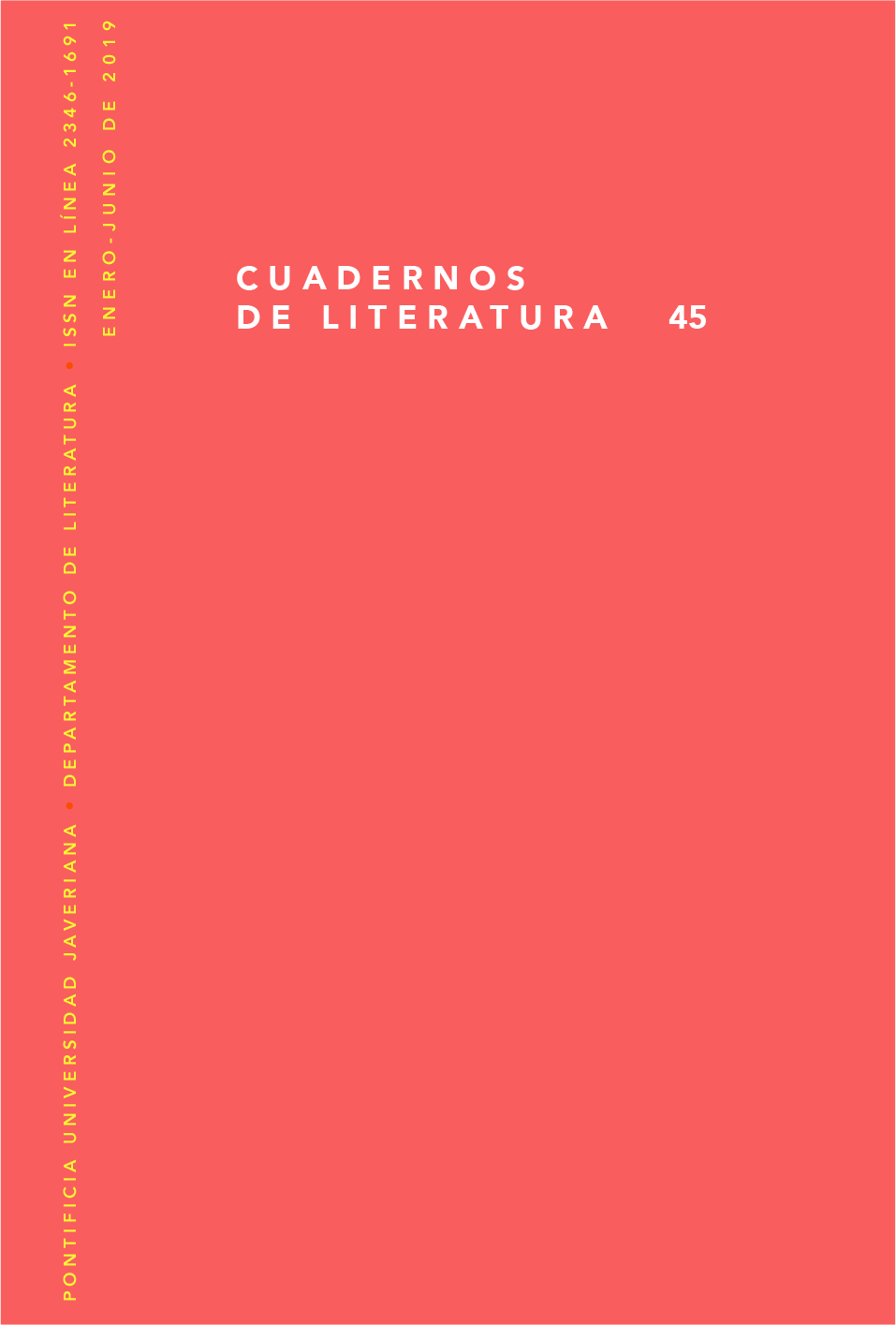Resumen
El artículo propone que en We the Animals (2011), novela de Justin Torres, la vida animal descubre las fronteras artificiales que sostienen el imperio de lo humano y desarticula su “natural” alteridad respecto de las regulaciones biopolíticas que controlan y definen la vida humana. El objetivo es demostrar cómo, a través de las relaciones familiares de los personajes, se desarrolla un espectro de emociones humanas que rozan la animalidad y que nos obligan a discutir la hegemonía de los registros y tecnologías que han normalizado la naturaleza humana como paradigma de la vida y han exaltado su representación en el hombre blanco como eje del pensamiento y sociedad modernas. El análisis se enfoca en dos aspectos: la idea de la relación de lo animal con el mestizaje y con la sexualidad, con el fin último de explorar cómo esta apertura hacia este otro lugar posantropomórfico y poshumano es quizás una alternativa política para pensar los cuerpos y las subjetividades poscoloniales, fronterizas, mestizas y diaspóricas que habitan aquello que se define como el Caribe.
Cragnolini, Mónica B. Extraños animales. Filosofía y animalidad en el pensar contemporáneo. Buenos Aires: Prometeo Libros, 2016. Impreso.
Esposito, Roberto. Communitas. Origen y destino de la comunidad. Trad. Carlo Rodolfo Molinari Marotto. Buenos Aires: Amorrortu Editores, 2003. Impreso.
Fernández Retamar, Roberto. “Calibán”. Todo Calibán. Buenos Aires: Consejo Latinoamericano de Ciencias Sociales (CLACSO), 2004. 19-81. Impreso.
Giorgi, Gabriel. Formas comunes. Animalidad, cultura, biopolítica. Buenos Aires: Eterna Cadencia, 2014. Impreso.
Giorgi, Gabriel y Fermín Rodríguez. “Prólogo”. Ensayos sobre biopolítica. Excesos de vida. Comps. Gabriel Giorgi y Fermín Rodríguez. Buenos Aires: Paidós, 2007. 9-34. Impreso.
Jáuregui, Carlos A. Canibalia. Canibalismo, calibanismo, antropofagia cultural y consumo en América Latina. Madrid: Iberoamericana Vervuert, 2008. Impreso.
Massumi, Brian. What Animals Teach Us about Politics. Durham - London: Duke UP., 2014. Impreso.
Sánchez-Prado, Ignacio M. “El giro (post)humanista. A manera de introducción”. Revista de Crítica Literaria Latinoamericana 34.68 (2008): 7-18. Impreso
Torres, Justin. “Introduction. Don’t Get Used to It: Queer Literature in a Time of Triumph”. Emerge: 2015 Lambda Literary Fellows Anthology. Ed. Marissa JohnsonValenzuela. Lambda Literary, 2016. Impreso.
Torres, Justin. We the Animals. London: Granta, 2011. Impreso.
Torres-Saillant, Silvio. An Intellectual History of the Caribbean. New York: Palgrave Macmillan, 2006. Impreso.
Wynter, Sylvia. “‘No Humans Involved’: An Open Letter to My Colleagues”. Forum N.H.I. Knowledge for the 21st Century 1.1 (Fall 1994): 42-73. Impreso.
El material gráfico analizado o directamente referido en el artículo, debe ser de alta calidad, presentarse en hojas individuales, en orden secuencial, y con una resolución mínima de 300 dpi en formatos JPG o TIFF. Los cuadros, diagramas, fotografías y gráficas deben estar acompañados de sus respectivos pies de foto, indicando la fuente de la que fueron tomadas, el título y su ubicación dentro del texto. Es responsabilidad del autor obtener el derecho de autor y permiso para reproducir las imágenes que desea utilizar en sus artículos. Este permiso debe ser para su reproducción impresa y online. Cuadernos de Literatura no reproduce cualquier imagen sin su respectiva autorización.
La revista Cuadernos de Literatura se encuentra registrada bajo la licencia Creative Commons Reconocimiento 4.0 Internacional. Por lo tanto, esta obra se puede reproducir, distribuir y comunicar públicamente en formato digital, siempre que se reconozca el nombre de los autores y a la Pontificia Universidad Javeriana. Se permite citar, adaptar, transformar, autoarchivar, republicar y crear a partir del material, para cualquier finalidad (incluso comercial), siempre que se reconozca adecuadamente la autoría, se proporcione un enlace a la obra original y se indique si se han realizado cambios. La Pontificia Universidad Javeriana no retiene los derechos sobre las obras publicadas y los contenidos son responsabilidad exclusiva de los autores, quienes conservan sus derechos morales, intelectuales, de privacidad y publicidad.
El aval sobre la intervención de la obra (revisión, corrección de estilo, traducción, diagramación) y su posterior divulgación se otorga mediante una licencia de uso y no a través de una cesión de derechos, lo que representa que la revista y la Pontificia Universidad Javeriana se eximen de cualquier responsabilidad que se pueda derivar de una mala práctica ética por parte de los autores. En consecuencia de la protección brindada por la licencia de uso, la revista no se encuentra en la obligación de publicar retractaciones o modificar la información ya publicada, a no ser que la errata surja del proceso de gestión editorial. La publicación de contenidos en esta revista no representa regalías para los contribuyentes.
El retiro de un artículo se solicitará por escrito con un documento impreso al Comité Editorial y se formaliza con la respuesta oficial del Comité.


